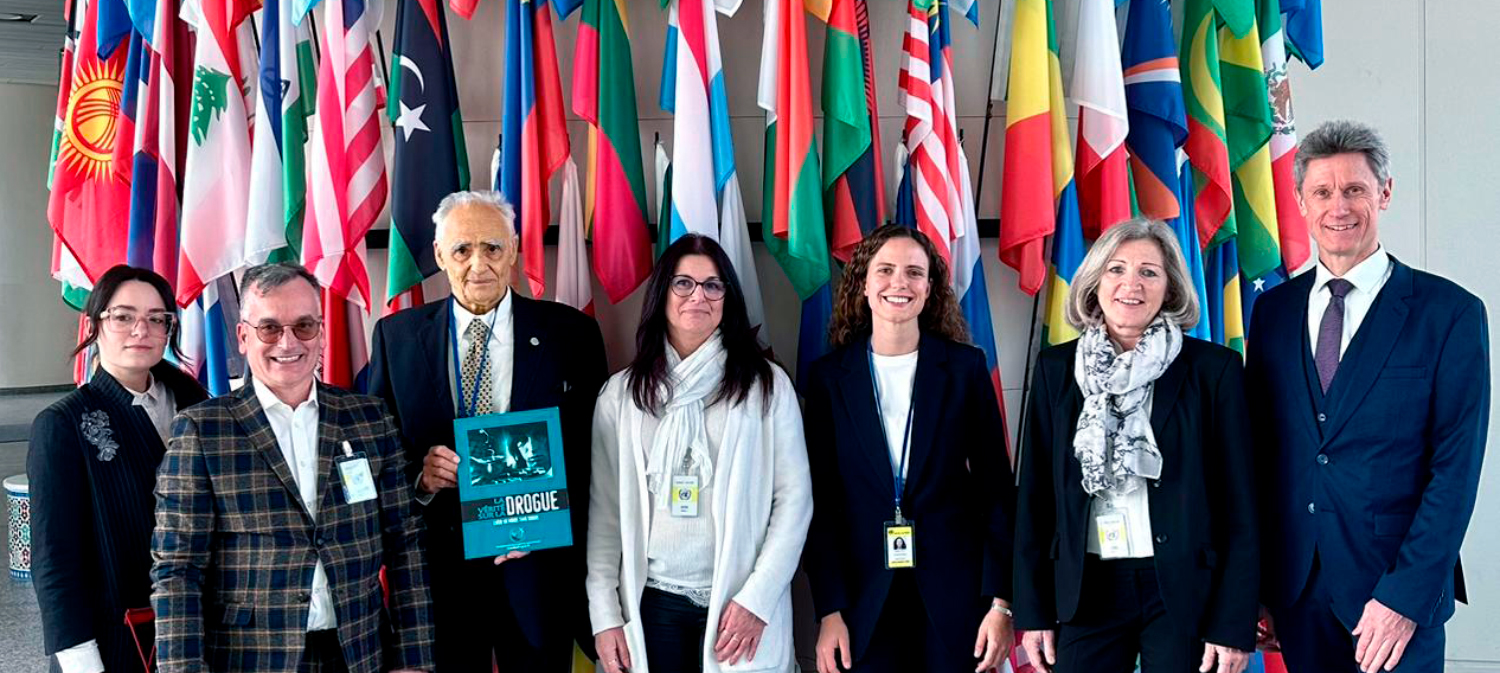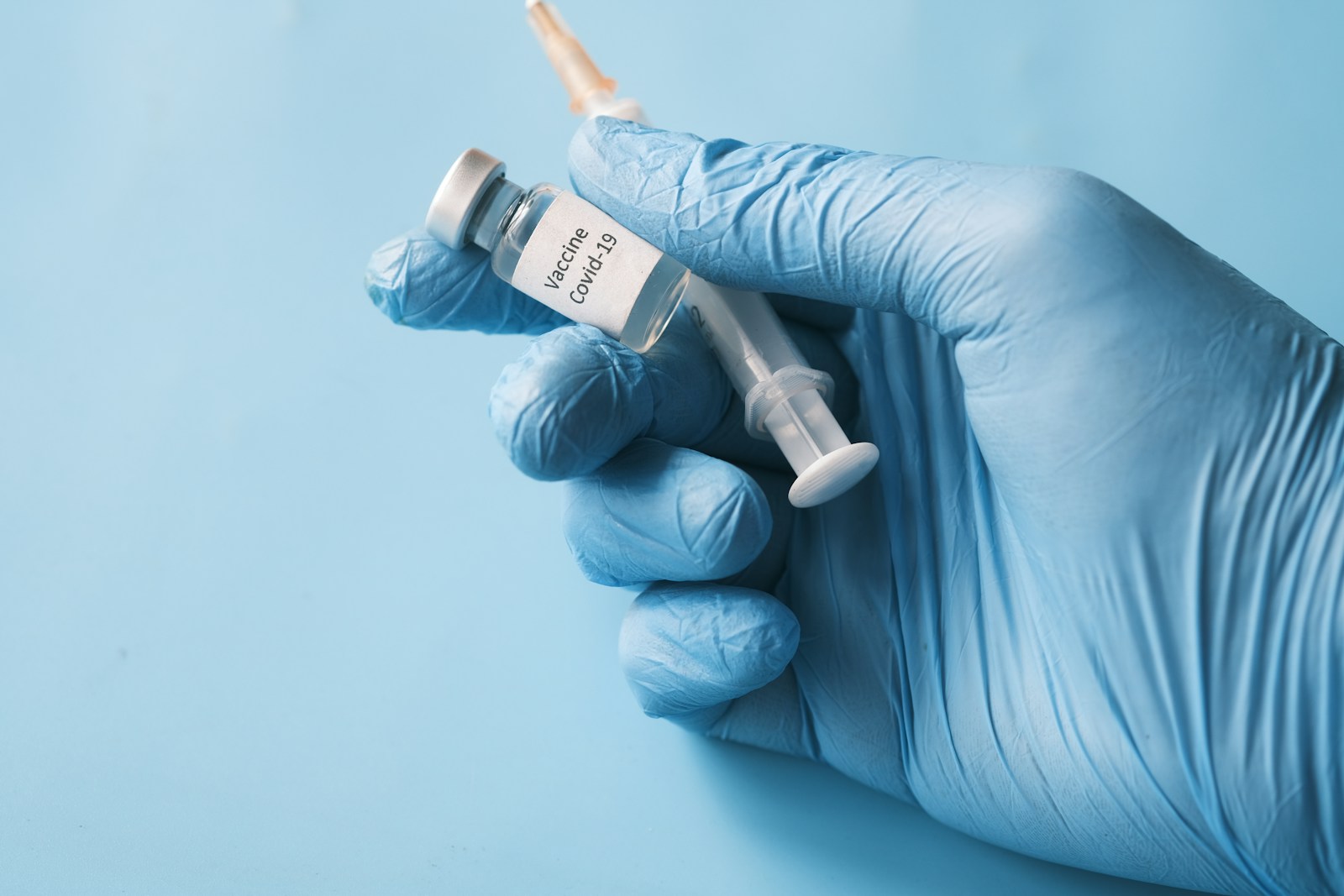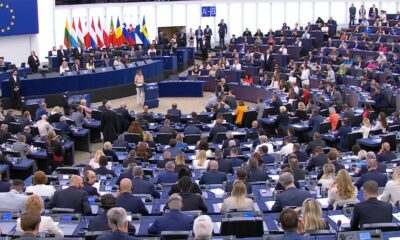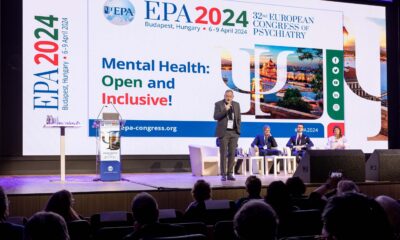Health & Society
The Drugs, the 67th CND and the FDFE, 20 Years of Good Practices of Drug Prevention for a Drug-Free Europe

In order to federate the different activities in the drug prevention fields of the hundred of Say No To Drugs European organisations and groups located in some 20 countries across Europe, the Foundation for a Drug Free Europe (FDFE) was created in March 2004, during the 47th Session of the Commission on Narcotic Drugs (CND) of the United Nations Office on Drugs and Crime (UNODC).

Since its creation (1946) the CND purpose is “to review, analyze the global drug situation, considering supply and demand reduction. And to take action through resolutions and decisions.” The CND is mandated “to decide on the scope of control of substances under the three international drug control conventions (1961, 1971 and 1988 Conventions).”
20 years of hard work

20 years later (March 2024), pursuing its Mission purpose, the FDFE is aware, since a decade, of the push of the high levels drug dealers whether they are “white-collars”, including Big Pharma (providing the precursors), the psychiatric field always complaining for “more resources” to get results, of all the NGOs money-centered in guise of “help”and concerned by the drug business with harm reduction, shooting rooms, making an illegal drug use legal, broadly using the “no-stigmatisation” to support them, highly using substitution treatments (legal drugs vs. the same illegal ones) but rarely promoting an effective rehabilitation not to say the prevention!
The first only basic action which can curtail the drug availability is the primary prevention at the youth level with the full support of a government enough concerned by the health of his population and of its developing youth, to take the correct decision about the drug expansion! There had been enough discussions years after years by the UNODC/Governments on the subject, but few realisation at the grass root levels despite the UNODC efforts. The worst is when governments are violating the Conventions and deciding to “legalize” some most common used drugs (to make more money…) but omitting to consider the following health expenses directly or not in relation with these drug use.
So, 2024 had been an opportunity for FDFE with the key support of the Fundacion para la Mejora de la Vida, la Cultura y la Sociedad having the ECOSOC status, to organize the side-event “20 Years of Good Practices of Drug Prevention for a Drug-Free Europe, at the UN, 21th March, Room MOE100, 14:10-15:00, during this 47th Session of the CND, always in Vienna (Austria) in the huge Vienna International Center (VIC).
In the following, we will strive to share with you the importance of prevention, education and illustrate what can be done at a responsible NGO level to revert the drug use trend among the youth.
About FDFE and the Drug Problem

FDFE is a non-profit NGO established in March 2004 (20 years ago!) and a partner of the Foundation for a Drug-Free World, freely providing the educational materials. FDFE is also member of different international organisations and had been invited across the world to present its educative materials of prevention, now translated in 17 languages!

The Drug Problem!
In all countries, from the richest to the poorest, drugs are challenging the health, weakening the education, flooding the criminal justice, threatening the social welfare and the economy, perverting the political system, generating huge wealth and power for the few and limitless harm and misery for the many, costing millions of lives and endangering the very sustainability of communities.
This alarming statement was written about 6 years ago. But despite the repeated warnings of UNODC, today all these points that have not been taken up seriously by the different authorities are unfortunately and durably affecting a still drug-affairs ignorant social fabric!
Our different European fields of activity:
Fully aware of the importance of acting at grass roots levels, directly concerned by the harming effects of drug use, FDFE developed many Drug Prevention Centers across Europe, and is currently working with a hundred of associations and groups located in: Austria, Belgium, Bulgaria, Cyprus, Czechia, Denmark, Finland, France, Germany, Greece, Hungary, Ireland, Italy, Luxembourg, Netherlands, Norway, Portugal, Romania, Slovakia, Spain, Sweden, Switzerland, Ukraine, UK, etc.
So, to harmonize the activities, educative materials were developed:
-14 factual booklets from the series The Truth About Drugs.
As a reminder, the first “educative booklet” had been written in the 1980ies in Switzerland by a colleague and already using scientific data. He was eager to warn the youngsters about the untold harming effects of the drug use. Based on its success, the idea had been progressively developed across the world to reach today the number of 14 booklets in 17 languages. They have even inspired some governments or be used by them to inform and protect the youth from the drug use!

-A Documentary DVD with testimonies from former drug addicts, and short Public Service Messages (as for TV channels).
-A full education package Guide with lessons for teachers and educators.
The final purpose is to empower the youth and young adults with scientifically proven facts, easily understandable. So, fully aware of the drug reality, away of dealers and marketing influences, they can responsibily make an informed decision.
FDFE, its associations and groups are definitely supporting the UN International Drug Control Conventions (1961, 1971, 1988), the Convention on the Rights of the Child (1989), the 17 Sustainable Development Goals (2015-2030), the activities of the European Monitoring Center (EMCDDA) and of the different agencies protecting the European borders.
During the Opening of the 67th Session of the Commission on Narcotic Drugs, 14th March 2024, the UNODC Director-General/Executive Director, Ghada Waly, again, clearly positioned the problem and the needed actions:
“The international drug control conventions have a timeless goal at their heart: the health and wellbeing of humankind.
“UNODC pledges to stand with you for a healthier, safer, and more prosperous future for all.”
“And we must invest far, far more in prevention, with a special focus on children and adolescents, who are more likely to develop disorders the earlier they begin drug use.”
Our Actions on the European Ground
To fit in the 50 min allocated time for the side event, 4 associations were selected to compose our panel:

1) Sag Nein Zu Drogen, Zag Ja Zum Leben (Austria).
This is a non-profit Organisation for drug education and prevention with the following goals: A society without abuse of drugs, alcohol and medication or other narcotics.

To raise public awareness about the destruction caused by drugs and to provide young people and adults with the facts so that they can make informed decisions about living a drug-free life.

This is achieved by contacting the youth and people where they are and making the real facts about drugs available to them.


2) Say No To Drugs (Belgium)



3) OUI à la Vie, NON à la Drogue (France)
In a recent interview (on Boulevard Voltaire – March 2024), Professor Xavier Raufer from Paris-Sorbonne, criminologist and specialist in social and political violence, terrorism and organized crime, considers that the recent attacks in Marseille (49 killed and 123 injured in one year) perpetrated by gangs and traffickers can be solved in 6 months! He said that the central question is not the one of means or even of political will, but of a currently missing political decision and the willing to face and to confront the 3 possible gangs weapons: intimidation, violence or assassination. X. Raufer said that they have in France the appropriate and national highly trained organization to solve this drug problem, in 6 months…

Indeed, the gangs will never dare to confront the State apparatus, especially since the French regalian State (those rights which belong exclusively to the State and cannot be delegated) is one of the strongest in Europe. The problem comes from the lack of orders…



4) Mondo Libero Dalla Droga (Italy)



In Fine,
Too often we are forgotting that all these psychotropic substances from plants, small animals, these “secondary matabolites” are only synthezised to defend the concerned species against any possible predator, including humans!
Being in direct contact with the population, youth, parents, teachers, institutions, and even former drug users and for many, how they went out of the dependance the hard way, we are deeply convinced that education is the real drug basic solution as already noticed 500 years ago by Leonardo da Vinci, and also later by Will Durant.

Starting by an early Prevention, that has to be continued along the curriculum, using progressive educative tools, and with a sane consensus from the Governments and Communities, this will enable to empower the youngsters on the harmful effects of illicit drug use.
Thus, aware, they can make an informed decision for a clean and successful life and realize their natural talents.
oOo
More on:
https://www.unodc.org/unodc/en/speeches/2024/cnd67-opening-remarks.html
Health & Society
ASTRAZENECA confirms in England that its vaccine can produce thrombi

The company AstraZeneca confirms in official documents that its vaccine against COVID-19 can cause side effects such as thrombosis. And it has done so due to the publication in The Telegraph newspaper of a series of data on a class action lawsuit filed in the English High Court for 51 cases of people who have died or suffered serious injuries.
La empresa se expone a una indemnización cercana a los 100 millones de libras. Al parecer, su vacuna “Vaxzevria, desarrollada con la Universidad de Oxford, causó la muerte y lesiones graves en decenas de casos. Los abogados argumentan que la vacuna produjo un efecto secundario que ha tenido efectos devastadores en un pequeño número de familias, informa el diario británico.” (1)
As early as 2021, the European Medicines Agency detected some cases of thrombosis with thrombocytopenia, also linked to Pfizer and Moderna vaccines. However, considering them so insignificant at that time, it decided not to investigate. Such cases did not generate concern then, nor do they do so now. They are considered collateral damage. Deaths or people with visible damage due to vaccines are diluted in the figures of those vaccinated and are insignificant for the organizations that have to monitor these companies.
How much money did the pharmaceutical companies make from the COVID-19 vaccine?
In an article from August 2021, almost three years ago, official figures were given on how much profit the COVID-19 business had brought in for pharmaceutical companies: “The international pharmaceutical majors involved in the production of the covid-19 vaccine collectively earned more than €24.5 billion in the first half of 2021, driven by growing demand for the drug. Pharmaceuticals Pfizer, AstraZeneca, Moderna and Johnson & Johnson made a net profit of €24.522 billion in this period, an increase of 66% over 2020.” (2)
From January to June 2021 Pfizer posted a profit of $10.44 billion, up 56% from the previous year (2020). AstraZeneca reported a net profit in the first six months of 2021 of $2.696 billion, up 51.7% from the previous year. Moderna, in the same time period reported earnings of $4,001 million, achieving the first net profit in its history. Finally, Johnson and Johnson reported a net profit of 12,475 million dollars, 32.4% more than in the first half of the previous year.
If we add to all the above millions that we are only referring to one period of the pandemic, imagine the amount of money they have moved since then, and especially if we take into account that the vaccine against Covid-19 has practically become chronic, just like the flu vaccine.
The fact that now the international criminal courts are forcing them to pay some small amounts does not mean any reduction in their treasury coffers. The big pharmaceutical companies, with the help of the media and above all of the states, have forced us to buy, through FEAR, a vital necessity: to be vaccinated so as not to be pointed out as a danger to society, as it happened in those years, where even the security forces of the states were put to the task of arresting and fining those who, exercising their rights, refused to be vaccinated.
Today it is AstraZeneca who is paying, hopefully others will follow in other countries and then class action lawsuits will follow against governments and politicians. Who will pay us citizens back for the time stolen?
1.- AstraZeneca admite que su vacuna contra el Covid-19 puede provocar efectos secundarios como la trombosis (msn.com)
2.- ¿Cuánto dinero ganan las farmacéuticas gracias a las vacunas del covid? (atlantico.net)
Health & Society
4 reasons why red wine is no longer healthy

Scientists and doctors have considered red wine to be healthy for years. A study linked moderate alcohol consumption – defined as one drink or less per day for women and two or less per day for men – to a 30-40% lower death rate from heart disease in drinkers compared to non-drinkers, Forbes reports.
Red wine has become healthy because it contains not only alcohol, but also the health-enhancing antioxidants from the grape skins. One powerful antioxidant is resveratrol, which repairs damaged blood vessels, prevents blood clots and reduces inflammation. This has led experts to recommend red wine in moderation for health benefits. Wine sales have grown tremendously since the 1990s.
Now we think differently. Moderate drinkers live longer on average, but not because they drink alcohol. This is because they tend to be healthier – more active, more educated, eat better food. Early research led us to believe that moderate consumption was healthy. But here are four reasons why you shouldn’t think of red wine as healthy, even if you drink less than a glass a day.
1. Moderate alcohol consumption is associated with worse, not better, cardiovascular health A 2022 study in JAMA Network Open looked at 371,463 people in the UK and found that moderate drinking was associated with 1.3 times higher risk of high blood pressure and 1.4 times higher risk of coronary heart disease. The study took into account a person’s genetic predisposition to alcohol use, which helped overcome some limitations of earlier research.
2. Alcohol Use Increases Cancer Risk Even with Moderate Drinking Alcohol is a known carcinogen, accounting for 6% of all cancers and 4% of cancer deaths, accounting for 75,000 cancer cases and 19,000 deaths annually in the US. Alcohol increases oxidative stress and the metabolic products of alcohol, namely acetaldehyde, damage liver DNA. It also directly damages the DNA of mouth and throat cells, significantly increasing the risk of breast cancer even with moderate consumption. Women who drink three alcoholic drinks a week have a 15% higher risk of breast cancer than those who don’t drink at all.
3. Sleep quality is worsened by alcohol Alcohol is a sedative. It helps you fall asleep faster. But this negatively affects the quality of your sleep. This is often noticeable even after a few drinks. A study of 4,098 Finns found that alcohol increased stress responses and impaired recovery during the first three hours of sleep. Along with hangovers, poor sleep makes you less alert the next day.
4. It Will Take a Deadly Amount of Red Wine to Benefit from Its Antioxidants Red wine contains resveratrol. But it doesn’t contain enough of it to significantly affect your health. A study measured how much resveratrol is absorbed into the body from a glass of alcohol, as well as two other polyphenols (catechin and quercetin) that have positive effects on health. Blood concentrations of all three were found to be too low to be beneficial. To get high enough, you need to drink a large amount – gallons, in fact.
Photo by Ion Ceban @ionelceban: https://www.pexels.com/photo/close-up-photo-of-brown-labeled-bottles-2580989/
Health & Society
Scientology’s Stand for Human Rights: A Look at the Budapest Protest Against Psychiatry

Press release. In Budapest, the Citizens Commission on Human Rights (CCHR) staged a protest during the European Psychiatric Association Congress, criticizing harmful psychiatric practices. The event featured a march and an exhibition, highlighting the need for substantial reforms in the mental health industry, as requested by United Nations and the World Health Organization.
A protest took place in Budapest challenging practices within the field of psychiatry during the European Psychiatric Association Congress. The Citizens Commission on Human Rights (CCHR) organized this demonstration to shed light on what they view as abusive or harmful methods in psychiatry. The event included a march and an exhibition aiming to bring attention to issues within the mental health industry and advocate for significant reforms.

The EPA Congress, held in April 2024 faced criticism for not taking action in response to recent directives from international bodies such as the UN and the World Health Organization. These directives called for an end to abusive psychiatric approaches, a matter that critics felt was not adequately addressed by the EPA’s theme of “Mental Health: Open and Inclusive.”
Led by CCHR Hungary, the protest began with a march through Budapest’s city center that concluded at the Budapest Congress and Exhibition Center, where the EPA Congress was being held. The march remained peaceful yet impactful, underscoring the protesters calls for reforms in practices.
After the march, CCHR Hungary presented an exhibit titled “Psychiatry; An Industry of Death.” This display, showcased in cities across the United States and Europe, utilizes records, videos and other types of evidence gathered over a span of more than five decades to scrutinize the field of psychiatry. The exhibit reveals the repercussions of psychiatric methods, including contentious treatments like brain operations and “electroconvulsive therapy” and how they have influenced various aspects of society including prominent artists and historical events.
During the exhibit’s unveiling, János Dobos, the head of CCHR Hungary, spoke fervently. “This material underscores the impact of psychiatry and the often harmful effects it has on individuals and society as a whole” stated Dobos. “It is essential for us to question these practices and advocate for treatment alternatives.”
Known for its intense content, the exhibition cautions visitors about its nature and allows entry to individuals only above 16 years old, unless accompanied by an adult. Its goal is to inform the public about events and current challenges in psychiatry while promoting a reassessment of how mental health issues are addressed and treated.

CCHR, the mental health watchdog organization founded in 1969 by psychiatrist Thomas Szasz in collaboration with the Church of Scientology, has consistently sparked attention and support due to its critical yet accurate perspective on psychiatry and its methods.
Recent incidents in Budapest have triggered a discussion on the involvement of psychiatry, in contemporary healthcare and the moral consequences of its methods. As discussions progress CCHR aims to persist in supporting what they see as changes to safeguard individuals rights and enhance mental health services globally.
Members of the Church of Scientology, the religion founded by L. Ron Hubbard, are dedicated to promoting rights, especially in the realm of mental health. Drawing inspiration from Mr. Hubbard’s teachings, they advocate for the safeguarding and acknowledgment of the rights of all individuals in healthcare, stressing the importance of holistic approaches to mental health care. This dedication forms part of a goal to make human rights a tangible reality across all aspects of life, including within the field of mental health.
-

 Sports5 days ago
Sports5 days agoMercedes celebrates Monza: “Goosebumps.”
-

 Sports4 days ago
Sports4 days agoCharles Leclerc at Monza outperformed even Michael Schumacher.
-

 Politics6 days ago
Politics6 days agoEuropean Parliament begins its 10th term
-

 Sports4 days ago
Sports4 days agoUS Open, Jannik Sinner sweeps Tommy Paul in three sets: he’s in the quarters
-

 Health & Society3 days ago
Health & Society3 days agoDoctors are not trained in how to discontinue psychiatric drugs
-

 Sports4 days ago
Sports4 days agoMilan: Ismael Bennacer does not leave, Adrien Rabiot does not arrive
-

 Sports4 days ago
Sports4 days agoNo one like Jannik Sinner in the Slams, but now there’s Daniil Medvedev
-
EU & the World4 days ago
Adele Announces ‘Incredibly Long’ Hiatus After Las Vegas Residency Ends





















